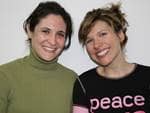
When parents learn their child has attention deficit hyperactivity disorder, they often find themselves facing a mountain of treatment approaches to improve their child's well-being. Most parents will find an element of control in one or more of the many psychosocial, behavioral or pharmaceutical treatments available for ADHD. Dr. Eugenia Chan, director of the ADHD program at Children's Hospital Boston says there's no "instant fix" for ADHD.
"It takes a sustained effort by a team of people, including parents, teachers, doctors, and other health professionals," she says.
There are as many approaches to changing a child's behavior as there are cable channels. Finding the right ones will require some creative strategizing and some trial and error before you are able to tune in to a few effective methods.
While many children and their families have found solace and support in drug treatments for ADHD, other parents would prefer to not medicate their child and turn to nonmedicinal treatments instead.
Here are seven med-free strategies that might help kids with ADHD gain focus and control. (Be sure to discuss any new treatment approaches with your health-care provider before trying them with your kids.)
Get Beyond the Time-Out -- Be very clear and specific about what is expected from the outset. For example, instead of saying, "Clean your room," say, "Straighten your bed blankets and pillows." Working with just a few small, reachable goals is more manageable. And let your child help devise goals.
Use charts, checklists and reminders to keep track of the progress and to look for patterns -- both negative and positive.
Send in the Reinforcements -- Who doesn't want to be rewarded for doing good work? If the result is a good one, show praise for the behavior by recognizing it with a reward -- a gold star, well-deserved privilege or other mutually agreed-upon prize. Chan says it is just as important to actively (and selectively) ignore undesirable behaviors as it is to recognize and reward the good ones.
"One of the core problems in children with ADHD is the inability to keep themselves from doing something even though they know it's wrong, says Chan. Some things are clearly not OK, such as aggression and threats to safety -- but other things can wait."
Start Moving -- Sounds counterintuitive to tell a child with ADHD to move more, but exercise has wide-reaching benefits to brain function. While straightforward exercise, such as walking or cycling, helps to flood the brain with focus-sharpening neurochemicals, programmed exercise turns on higher centers of the brain that promote organizational functioning.
Physical activities that require kids to pay close attention to where their bodies are in space are better at sustaining focus and concentration. Martial arts, ballet or gymnastics are good choices. And yoga is especially good because it incorporates controlled breathing techniques, posture and meditation that all work to improve concentration and reduce stress. Don't dissuade a physical activity that your child likes, even if she doesn't excel at it.
Go Green -- Kids with ADHD often spend a lot of time indoors receiving therapy and extra help. But a few studies tout the benefits of exposing children with ADHD to natural environments and open space as a way to reduce "attention fatigue" that kids with ADHD experience after long periods of time spent concentrating indoors. A University of Illinois study published in the March 2009 issue of the Journal of Attention Disorders found that children with attention deficits concentrate better after a short 20-minute walk in a green park.
Watch What They Eat -- When looking for reasons to explain behavior changes, diet is often in the line of fire. Sugar is the most maligned, but food coloring, preservatives and natural and artificial salicylates in foods have also been implicated. While the scientific evidence linking these foods and behavior is thin, eliminating foods with a high potential for allergies -- dairy products, wheat, corn, yeast, soy, citrus, eggs, chocolate and nuts -- might reduce ADHD symptoms in certain highly sensitive children.
If you are planning to alter your child's nutritional intake, consider working with a registered dietician to assure you maintain a well-balanced diet during the process of elimination. Keep a detailed food diary to see if there are any positive behavioral changes associated with removing or adding certain foods.
Get Wired -- In biofeedback sessions, which are led by a trained practitioner, your child would wear a cap connected to sensors that measure brain activity while she is engaged in a focus-promoting game displayed on a computer screen. If she loses focus, the game stops, encouraging her to regain focus in order to continue playing the game. The hope is that children will practice focused activity for increasing periods and will learn to sustain their attention outside of therapy.
Put Them to Work -- Finding something that a child with ADHD enjoys and takes pride in can give him a sense of purpose and self-control while diffusing some negative behaviors and tension.
"A lot of kids with ADHD have poor coordination, so finding a creative or service-oriented activity they genuinely enjoy is important for building self-esteem and self-confidence, says Chan. "And the child does not necessarily have to do the activity well for it to be effective."
And while doing chores is, well, a chore, performing household tasks can be good work, too. Be specific about what is expected, give a deadline and tell them how they will be compensated -- extra TV time or other recognition of service.
[By Tina Pavane]



















